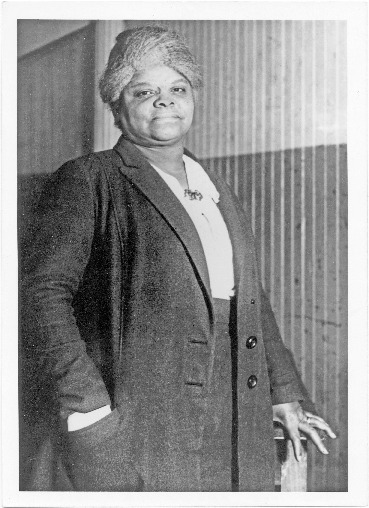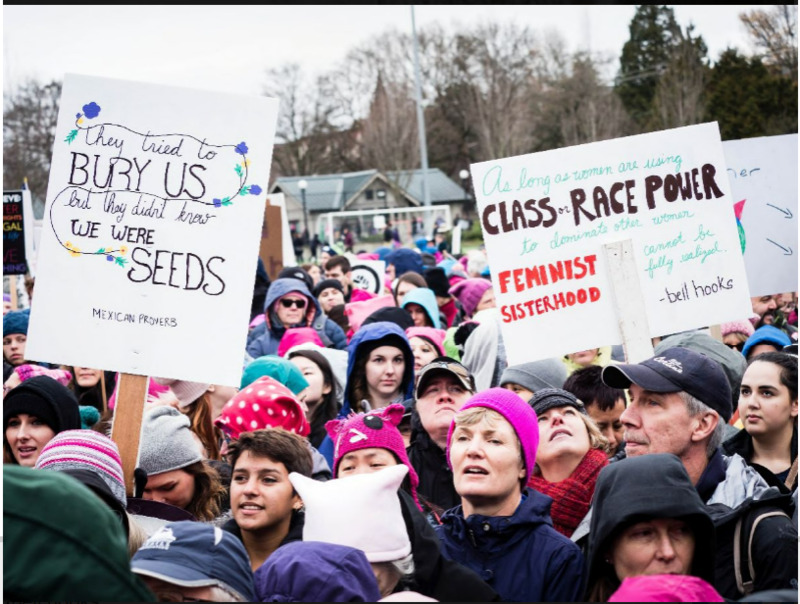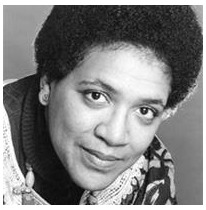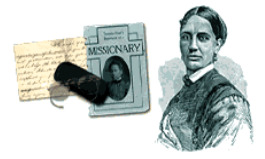African American Feminist Writers
Curated by Anonymous
African American Women have had a long history of using their words to fight for change. In this exhibit you will see some of the Women, hear their voices, and see their Writings. The African American Feminist writers of the past century have had a powerful impact on not only the writing world. Many of these women were activists, and had to be activists in order to have their voices heard.
The artifacts we've found we’ve curated from a number of online open source databases. They contain examples not only of photos, images and excerpts. These artifacts we have curated seek to show how Lasting an impact these women had on their respective fields. There are many more examples of how African American women have mixed their talents in writing with their activism.
The amplification of voices not normally heard or presented is an important part of feminist knowledge creation. There have been many powerful author-activists over the past century, and here we are highlighting only a few of these women. But, we hope to pique your interest into looking deeper into the world of African American writers and those women who have helped make publishing these writers a possibility.
|
Charlotte Watson Sherman was born in Seattle in 1958, the eldest child in a working class family. Watson dreamed of being a writer as a child, and published her first poem at 19. She has since had her poetry published in a number of journals, and in the anthology "Gathering Ground: New Writing and Art by Northwest Women of Color." She is the author of the short fiction collection "Killing Color"; two novels, "One Dark Body" and "touch"; as well as a children's book, "Eli and the Swamp Man." Watson also edited the anthology "Sisterfire: Black Womanist Fiction and Poetry." |
Octavia Butler (1947-2006) was an award winning author of fiction and essays. She was the first African American Woman to win a MacArthur fellowship's Genius Grant, as well as the first African American Woman to win the Hugo and Nebula. She was posthumously inducted into the Science Fiction Hall of Fame, given the solstice award, Locus award, and a lifetime achievement in writing from PEN.
Dr. Chandra Mohanty and Professor Linda E. Carty are a powerhouse team of academic activists who have come together to write and interview a huge number of feminist and activist authors from all walks of life. Here they interview Dr. Barbara Smith a founding member of the Combahee River Collective, prolific writer and cofounder of Kitchen Table: a Women of Color Press. As well as an interview with Dr. Gloria Joseph who used an interdisciplinary method in her teaching to counteract racism and bigotry.
Ida B. Wells was a famous African American Suffragette as well as investigative journalist. She wrote extensively on many subjects. Some of her most notable works include The Red Record (1895) which brought light to the horrendous acts of lynching going on in the united states of america.
Here is a photo from a very recent protest where a sign can be seen quoting Bell Hooks (1952-2021). "As long as women are using class or race power to dominate other women, feminist sisterhood cannot be fully realized. - bell hooks"
Bell Hooks holds an important place in the activist writing of the past century. Her influence can be seen to this day, and her words are so powerful that they are used on protest signs.
Audre Lorde is one of the most significant and influential Black feminist writer/activists of the 20th century, Lorde was born in 1934 in New York City to parents of Caribbean ancestry. She graduated from Hunter College in 1959 and earned a master’s degree in library science from Columbia University in 1960.
Lorde attempted to join the Harlem Writers Guild, but the overt homophobia of the group caused her departure. She held numerous teaching positions; formed coalitions between Afro-German and Afro-Dutch women; founded a sisterhood in South Africa; was a co-founder of Kitchen Table Women of Color Press; and established the St. Croix Women’s Coalition where she was living at the time of her death in 1992 from breast cancer. Lorde’s first book of poetry, “The First Cities,” was published in 1969.
A decade later, she published her “Cancer Journals,” and later “Zami: A New Spelling of My Name” (1982) and “Sister Outsider” (1984), her first collection of essays. Both “Zami” and “Sister Outsider” are staple texts in hundreds of women’s studies classes.
The nineteenth century was a formative period in African-American literary and cultural history. Prior to the Civil War, the majority of black Americans living in the United States were held in bondage. Law and practice forbade teaching blacks from learning to read or write. Even after the war, many of the impediments to learning and literary productivity remained. Nevertheless, black men and women of the nineteenth century learned to both read and write. Moreover, more African-Americans than we yet realize turned their observations, feelings, social viewpoints, and creative impulses into published works. In time, this nineteenth-century printed record included poetry, short stories, histories, narratives, novels, autobiographies, social criticism, and theology, as well as economic and philosophical treatises. Unfortunately, much of this body of literature remained, until very recently, relatively inaccessible to twentieth-century scholars, teachers, creative artists, and others interested in black life. Prior to the late 1960s, most Americans (black as well as white) had never heard of these nineteenth-century authors, much less read their works.
The civil rights and black power movements created unprecedented interest in the thought, behavior, and achievements of black people. Publishers responded by revising traditional texts, introducing the American public to a generation of new African-American writers, publishing a variety of thematic anthologies, and reprinting a plethora of "classic texts" in African-American history, literature, and art. The reprints usually appeared as individual titles or in a series of bound volumes or microform formats.





